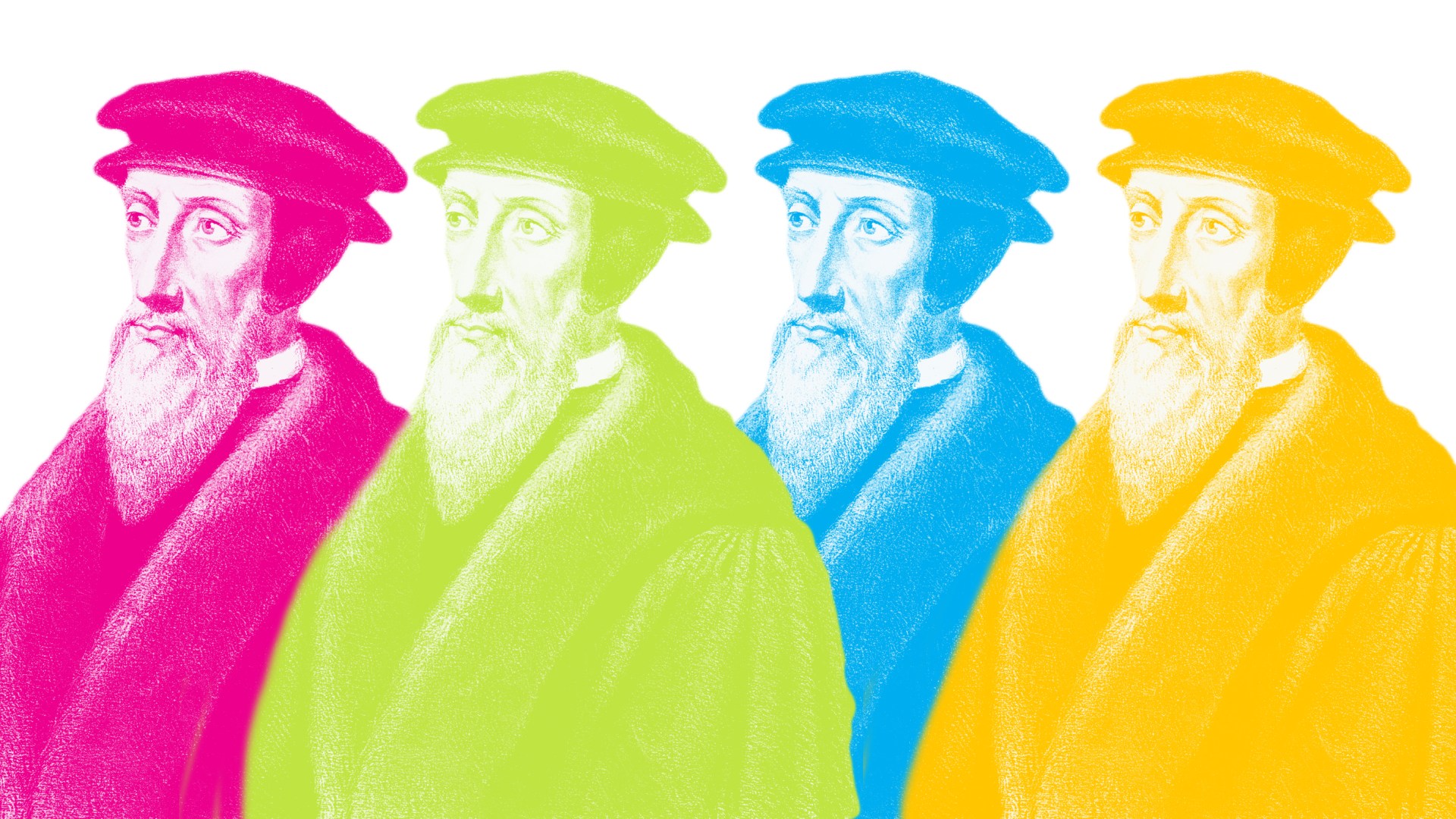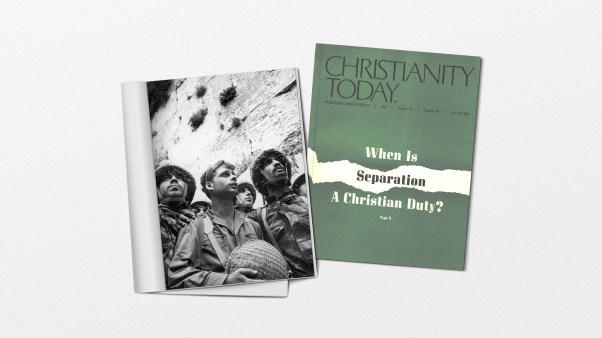Few figures in church history have been so much loved or hated, admired or despised as John Calvin. Calvinism—the theological orientation bearing the French theologian’s name—has also had mixed reception. Reformed theologian Oliver Crisp, professor of systematic theology at Fuller Theological Seminary, says Calvinism and the Reformed tradition is more diverse and amiable than is often thought. CT assistant online editor Kevin P. Emmert talked with Crisp about his new book, Deviant Calvinism: Broadening Reformed Theology (Fortress Press), and the landscape of Reformed theology.
Why do you think it was important to write Deviant Calvinism?
I see a lot of misrepresentations of Reformed theology, among people both inside and outside the Reformed tradition. Many people think Reformed theology coalesces around five points or around the soteriological “doctrines of grace” rather than around historic confessions. And I see a lot of Calvinists who aren’t confessional, when in fact the Reformed tradition very much is. If you truly are a Calvinist, then you should be interested in Reformed confessions, I think. And when we look at the confessional tradition, it seems Reformed theology is broader than the more narrow five-point Calvinism.
Also, a number of people outside the Reformed community tend to associate the Reformed tradition with a narrowly dogmatic—in both senses of that term—way of thinking about the Christian faith. And they are rather disparaging about that. But not all of us are narrowly dogmatic. So I thought, Maybe the time has come to make a case for a more irenic, more sanguine, broad approach to the Reformed tradition, because there are great riches in the Reformed tradition that just don’t get reported.
Even though the book is more scholarly than popular, I think it addresses some hot issues in the air at the moment.
How has recognizing diversity within the Reformed tradition impacted you personally?
I come from a fairly theologically conservative background and have become more centrist over the years, but I very much want to hang onto the Reformed traditions.
By centrist, I mean someone who occupies a middle ground on the theological spectrum, open to dialogue and engagement with those to the right and the left of them. My Reformed heritage is important to me, and I am an evangelical. I would characterize my approach to theology as about building bridges to those of other persuasions, and seeking to be a patient listener and charitable interpreter, while taking a clear line on particular issues in keeping with the tradition of which I am a part. There is a long history in Reformed thinking of doing just this, so I do not see any tension between a centrist theological view and confessional Reformed thought.
In your book you refer a lot to the Reformed confessions. Why are the confessions, and not just the works of particular theologians, important for understanding Reformed theology?
It’s a matter of theological authority. In any theological discussion there are certain appeals to authority. As Christians, we believe Scripture is the norming norm, the ultimate basis for theological judgments. The catholic creeds of the first few centuries of the church are a secondary tier of norm that witnesses to Scripture. Then we have confessions that represent particular church bodies, like the 39 Articles of Anglicanism—which are very Reformed, I might add—and the Westminster Confession for Presbyterians. Confessions are a third tier of witness, norms that stand under Scripture and the catholic creeds. It seems to me the work of particular theologians are a step below the confessions, because confessions represent the common mind of a particular ecclesial body.
Do you see some Reformed or Calvinist Christians elevating the theology of particular individuals over the historic confessions?
I think that’s certainly a tendency. Maybe that’s a tendency for evangelicals in general. Evangelicals, particularly American evangelicals, have a somewhat naïve approach to theological authority. For many people, it’s simply a matter of “me and my Bible.” Most people don’t think much about how certain traditions do and should shape our theological judgments. Whatever church you’re in, whatever tradition you belong to, even if it’s a Free Church that claims no tradition—those communities shape us in profound ways, including our reading of Scripture. So that’s something I want us in the evangelical community to think about more carefully.
In terms of your particular question, I think there is a danger in elevating particular thinkers over confessions and over a wider appeal to tradition. No one theologian, however important, can trump the voice of the church expressed in the creeds or confessions. Of course, the works of certain theologians have informed the confessions and can be very helpful. But they stand under the confessions. That’s the framework that informs my book and my thinking on how we should make theological decisions. And this isn’t just my view. John Calvin’s works aren’t the historic norm in Presbyterian churches; the Westminster Confession is. And Thomas Cranmer isn’t the norm for Anglican churches; the Book of Common Prayer and the Articles of Religion are.
My concern for people who elevate particular theologians over confessions as their guides is they may end up adopting not only the good but also the unhelpful things associated with such thinkers. Or one might end up cherry-picking some things and not others. Of course, this can happen in confessional Reformed thought, too. But it’s tougher to do because you’ve got a set standard that acts as a check against the views of any one person. The confessions, therefore, form an important framework that help us see both what is fundamental and what is not fundamental. That is a healthy thing, it seems to me.
At various points in your book, you set out to show the viability of particular doctrines that might be considered deviant from traditional Reformed theology. What is your main goal in doing so?
On one hand, I am concerned about ecumenical theology and the place of Reformed theology relative to other communions within Christianity. But I am also trying to show there is a significant breadth to the Reformed tradition that is often overlooked, that there is more wiggle room than is often perceived. And my book is drawing on the very careful historical scholarship that’s been done within the last 20 to 30 years by a number of great scholars.
This research shows there is a range of views tolerated in the framing of the Reformed confessions. One can take one of several views on a particular topic and still be considered Reformed. So the confessions as a framework often act in a way that sort of fences off what not to believe. For instance, if you don’t think God is triune, that’s unorthodox. But as long as you stay within the bounds of orthodoxy, the confessions allow for legitimate diversity of views.
What are some of those views?
One is the question of free will and salvation. Reformed theology is often identified with determinism—the idea that God determines everything, and we don’t really have free choice. From my eating Corn Flakes for breakfast to my having faith in Christ, all of these decisions are determined by God, and if we’re not automatons or robots at least, my decisions are only free in some very minimal sense. Well, historical material suggests there is a broader way of thinking about this within Reformed theology.
Two 19th-century Reformed theologians come to mind. The first is William Cunningham, who was a professor at the University of Edinburgh and one of the founding fathers of the Free Church of Scotland. He wrote an important essay on this topic, arguing that the Westminster Confession neither requires nor denies “philosophical determinism,” as he called it. He believed the Confession is conceptually porous on the matter and doesn’t commit its adherents to determinism, though it doesn’t exclude it either.
And the Southern Presbyterian John Girardeau argued at length against the influence of Jonathan Edwards on the topic of determinism. Whereas Edwards was a determinist all the way down, so to speak, Girardeau argued that the first human pair had a real undetermined freedom to choose between alternatives in original sin, and that fallen humans still have such freedom with respect to mundane choices like which political party to vote for, or whether to slap grandma rather than kiss her. But we don’t have this freedom in regard to salvation, he argued. That is beyond our reach and must be a work of God. Girardeau appealed to John Calvin over Edwards in defense of his views. He also appealed to the Reformed confessions, including the Westminster Confession, which certainly allows, in my opinion, that Adam and Eve had this freedom in their original estate.
If Cunningham is right, then the Confession is metaphysically underdetermined. Hence the wiggle room. If Girardeau is right, then the Confession is consistent with some sort of strong doctrine of circumscribed free will that is non-determinist in nature. That is a significant deviance from what is typically the received view on Reformed thought concerning human freedom.
In the book I give a lot of attention to Bishop John Davenent, one of a number of early Reformed theologians who held to a universal atonement—that Christ died for everyone, not just the elect. He was an eminent theologian, the Lady Margaret Professor of Divinity at Cambridge, and later the Bishop of Salisbury. He was chosen by King James to head the British delegation to the Synod of Dort, where we get the Five Points of Calvinism, including the doctrine limited atonement—that Christ died for only the elect. He signed the canons in good faith, believing they were consistent with his own views. At face value, that seems odd, given the story we usually hear about Dort and its Five Points. But if you look at the documents, it seems that Davenant was right and that there is indeed wiggle room. And there was no requirement in the 39 Articles for limited atonement. In fact, the 39 Articles, usually thought to be a good Reformed document, allows for universal atonement. So Davenant had no problems with either document.
Another hot issue is predestination: Who is elected by God in his eternal purposes? Karl Barth famously said Christ is the one elected and our election is somehow in Christ. And his view certainly isn’t in line with what has traditionally been accepted as the Reformed doctrine of predestination. I also tackle his doctrine in the book, trying to offer a charitable but critical account of it. Barth’s doctrine may be less familiar to some folks, but its impact within modern academic theology has been significant and continues to be important today. And, of course, Barth is the pre-eminent Reformed theologian of the 20th century. And some might say he’s the pre-eminent deviant Calvinist!
The Westminster Confession states the pope is the antichrist, that the Roman mass is idolatry, and that civil rulers have authority to punish heresy. Obviously, these reflect 16th- and 17th-century Protestant ways of thinking, and it seems most Reformed Christians today dismiss these types of claims. How, then, do Reformed Christians determine which portions of a confession to affirm and which to dismiss?
This is a good question, and it touches on something I’m still thinking about: What is the relationship between being part of a confessional tradition and theological progress or change? Traditions are living things. They develop and change over time. If they don’t, they stagnate and die. The Reformed confessions of the 16th and 17th centuries are important summaries of Christian teaching for Reformed Christians. But the Reformed have continued to write confessions. Take, for example, the Book of Confessions of the PCUSA, my own denomination. And in the 20th century, the Barmen Declaration was an important Reformed bulwark against Nazi ideology.
The Confessions are norms of a sort, but not immutable norms. They are subordinate to Scripture. In principle, all creeds and confessions are revisable in light of God’s Word. In fact, the Reformed Confessions do indeed contain things that we might balk at today, because we read Scripture differently. The examples you list are among those things. So, I say that these are norms that are revisable in light of the Word of God. But this is hardly anti-Reformed, given that the Reformed churches have always proclaimed that they are Always Reformed and reforming themselves according to the Word of God. So tradition is vital, but if it is a living, growing tradition, then it is also a dialogue between past and present, retrieval and revision, under the guidance of the Spirit and in light of God’s Word.
So how do we differentiate between claims in the Westminster Confession about the pope and claims about a doctrine like predestination?
It has to do with what is central and what is peripheral. Predestination is central to Reformed thinking. The claim that the pope is the Antichrist is not. Why not? Because we now regard the biblical basis for these claims differently than our predecessors did. I don’t think the pope is the Antichrist! Not for a moment. And I don’t think Scripture teaches this. The Reformers and their successors really did think this. They were mistaken. They also thought predestination is clearly taught in Scripture. In this they were right. It’s far more difficult to infer from Scripture that the pope is the Antichrist than to move from Ephesians 1 or Romans 8 to a doctrine of predestination.
Earlier you mentioned the role of Reformed theology within ecumenical theology. What sort of ecumenical advantages stem from recognizing the diversity within Reformed theology?
I think it puts the age-old debate between Arminians and Calvinists, for want of better words, in a slightly different light. I think too often energy is expended on reinforcing the barrier between us and the other. Seeing the wiggle room means there should be more conversation and less antagonism between the two groups.
Of course, as a theologian, I want to know the truth. That’s what theology is about. But I realize there are times when we don’t have as firm a grip on the truth as we think we do. That means that when it comes to debate within church and across traditions, perhaps we should exercise a little bit more intellectual humility and be more willing to consider the possibility that we may be wrong. And that’s crucial for trying to make Christ’s high priestly prayer at the end of John’s Gospel a reality, which I think is something we as evangelicals should take seriously.
Also, if we get a clearer picture of what is non-negotiable and what is negotiable, we will have a better perspective on what to spend our time focusing on.
In what ways do Calvinists and Arminians have more in common than is often perceived?
First of all, it’s important to remember that Jacob Arminius—whose views have become the basis of Arminianism—was a Reformed pastor and professor. He died a Reformed pastor and professor. His controversial views led to the Synod of Dordt and the now-famous Five Points of Calvinism. But he himself regarded his contribution as Reformed, even if his opponents didn’t.
So let me give two examples where there may be more common ground. In the doctrine of providence, Arminius introduced to Protestant thought the Roman Catholic doctrine of divine middle knowledge. This is the view that God knows the free, undetermined choices you will make in every given circumstance—even those that don’t actually happen—and ordains a world in which all the choices made by free creatures work out according to his providential plans. This has been resurrected by Christian philosophers since the 1970s, and today there is thriving literature on divine providence and middle knowledge. Some Arminians hold to it, though not all. And some Calvinists adhere to middle knowledge. I don’t want to make a judgment about the debate here. Rather, I just want to point out that there is overlap on an issue that has historically divided the two groups.
A second overlap is on the doctrine of creation. Take Jonathan Edwards, for example. He’s surely a stalwart of evangelical Reformed thought, yet he denied that there was a material world. He thought that the world emanated from God, that God is the only real cause of what happens in the world, and that there is no one single thing called “the world” that persists from one moment to the next: God re-creates the world out of nothing at every moment that it exists. He also thought that the world is contained in God in some strong sense. Now, compare that with Arminius, who thought that God creates and then sustains the world in being, that the world is distinct from God, and that God graciously governs it in all its details yet without doing violence to creaturely freedom. That sounds much more familiar to many of us. It’s fascinating to think that Arminius was closer to the Reformed consensus on the doctrine of creation than Edwards was.








